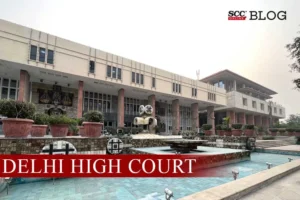Delhi High Court: In a case wherein, a bail application was filed under Section 439 of the Criminal Procedure Code, 1973 (‘CrPC’) seeking bail in FIR dated 07-07-2022, registered under Sections 120-B, 170, 384, 420 and 503 of the Penal Code, 1860 and under Sections 66-C, 66-D, 75 and 85 of the Information and Technology Act, 2000, Saurabh Banerjee, J., allowed the bail application and held that applicant-accused was protected under Article 20(3) of the Constitution against self-incrimination and therefore could not be coerced to reveal password or any other details in view of the protection provided to him under the Constitution.
Background
In the instant case, FIR was registered based on source information, wherein it was alleged that a company named E-Sampark Softech Pvt. Ltd. (‘the Company’) had made millions of scam phone calls to USA from fraud call center located in India and defrauded and cheated US citizens of about 20 million USD. The callers impersonated themselves as various government officials of USA such as Internal Revenue Service (IRS), Customs Officials, Immigration Officers, etc. and would threaten the US citizens with arrest, penalty, initiation of criminal case, fine, seizure of property, and coerced the victims to pay through various means.
Applicant’s counsel submitted that Respondent 1, Central Bureau of Investigation (‘CBI’) stated that applicant was not providing them password(s)/details with regard to his email, crypto wallet accounts, etc. It was submitted that bail could not be denied simply because of non-cooperation, since applicant could not be forced to incriminate himself by cooperating with CBI.CBI submitted that applicant being the director of the Company, was the real ‘king-pin’ behind the entire racquet and despite various notice served under Section 41-A of CrPC to participate in the investigation, he failed to provide CBI with passwords with regard to digital evidence that was recovered. It was further submitted that there was a possibility that applicant might threaten witness or tamper evidence if released on bail.
Analysis, Law, and Decision
The Court noted that the chargesheet with respect to co-accused persons, including applicant’s father and brother was filed without their arrest and it was only applicant who was arrested. The Court further noted that the proceedings primarily revolved around electronic evidences including laptops, mobile phones and such other sophisticated gadgets, which were already in possession of CBI and thus the Court opined that if bail was granted, then there were hardly any chances that applicant would tamper evidence. The Court also noted that there was no allegation of same kind against the father and brother of applicant who were not even arrested at all.
The Court opined that any accused like applicant in the present case was expected to show high sensitivity, diligence and understanding during such an investigation but at the same time, CBI could not expect anyone “to sing in a tune which was music to their ears”, and applicant was protected under Article 20(3) of the Constitution.
The Court relied on Santosh v. State of Maharashtra, (2017) 9 SCC 714 wherein the Supreme Court while relying on Selvi v. State of Karnataka, (2010) 7 SCC 263 had held that “the right against self-incrimination was provided for in Article 20(3) of the Constitution. It was a well-settled position that Article 20(3) enjoyed an “exalted status”. This provision was an essential safeguard in criminal procedure and was also meant to be a vital safeguard against torture and other coercive methods used by investigating authorities. Therefore, merely because applicant did not confess, it could not be said that applicant was not cooperating with the investigation. However, in case, there was no cooperation on applicant’s part for the completion of the investigation, it would certainly be open to seek for cancellation of bail.”. Thus, the Court held that as the trial was going on, applicant could not be coerced to reveal/disclose password(s) or any other details in the view of protection provided to him under the Constitution.
The Court further opined that the complainant and those who were allegedly cheated/defrauded by applicant were far beyond the reach of applicant and thus there were miniscule chances of applicant influencing the witness. The Court observed that applicant was on interim bail for a period of 203 days and did not misuse the liberty and thus opined that this Court did not find applicant to be a flight risk or that he would shun away from participating in the investigation as and when called for.
The Court further opined that though applicant was named in the FIR, however, till the final outcome of the case, his status would be of a suspect. The Court further relied on Hussainara Khatoon (I) v. Home Secy., State of Bihar, (1980) 1 SCC 81, and Satender Kumar Antil v. CBI, (2022) 10 SCC 51, and held that if applicant was kept behind bar then it would amount to violation of Article 21 of the Constitution.
The Court thus released applicant on bail.
[Sanket Bhadresh Modi v. CBI, Bail Appln. 3754 of 2023, Order dated 18-12-2023]
Advocates who appeared in this case:
For the Applicant: Dayan Krishnan, Senior Advocate; Jay Kumar Bhardwaj, Surabhi Mahajan and Shreedhar Kale, Advocates
For the Respondents: Anupam S. Sharma, SPP; Prakash Airan, Harpreet Kalsi, Ripudaman Sharma, Abhishek Batra, Syamantak Modgill and Kashitiz Rao, Advocates

